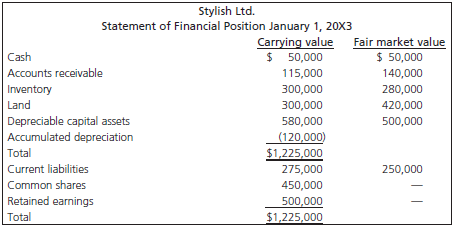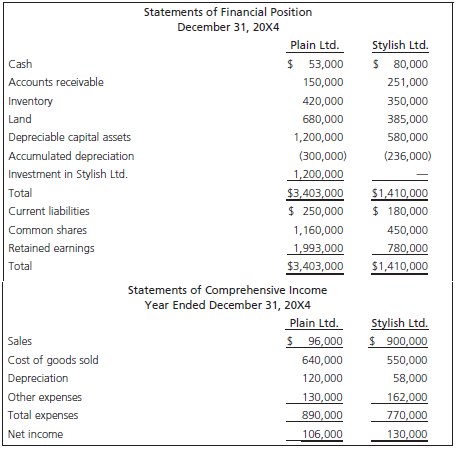Plain Ltd. acquired 80% of the voting shares of Stylish Ltd. on January 1, 20X3, for $1,200,000.
Question:

The inventory will be sold and the accounts receivable collected within 20X3, and the depreciable capital assets will be depreciated over 10 years, straight line, with no salvage value.
During 20X3, Stylish Ltd. sold inventory to Plain Ltd. for $180,000, with a 20% gross profit on the sale price. At the end of 20X3, $30,000 (at sale price) of these goods were still in the inventory of Plain Ltd. Plain Ltd. sold goods at $200,000 to Stylish Ltd. during 20X3, with a 30% gross profit on the sale price, and $50,000 (at sale price) of these goods were still in inventory at the end of 20X3. All of these goods remaining in inventory were sold during 20X4.
During 20X4, Plain Ltd. sold $150,000 of goods to Stylish Ltd., with a 25% gross profit on sale price, and $50,000 (at sale price) of these goods were in inventory at the end of 20X4. In addition, Stylish Ltd. sold goods to Plain Ltd. for $250,000, with a 20% gross profit on sale price, and $100,000 (at sale price) of these goods were still in inventory at the end of 20X4.
While Plain paid dividends of $20,000 in 20X3, Stylish paid $15,000; similarly, while Plain paid dividends of $25,000 in 20X4, Stylish paid $20,000.
The retained earnings balance of Plain on January 1, 20X3, was $1,650,000.
The following are the financial statements of the two companies at December 31, 20X4:

Required
Calculate the following under the entity method, considering all dates carefully:
a. Equity in the earnings of Stylish using the equity method for 20X3;
b. The adjusted earnings of Plain for 20X3;
c. Consolidated net income for 20X4;
d. Consolidated retained earnings balance at the end of 20X4;
e. NCI balance at the end of 20X4; and
f. Investment in Stylish account balance at the end of 20X3 under the equity method.
Financial StatementsFinancial statements are the standardized formats to present the financial information related to a business or an organization for its users. Financial statements contain the historical information as well as current period’s financial... Salvage Value
Salvage value is the estimated book value of an asset after depreciation is complete, based on what a company expects to receive in exchange for the asset at the end of its useful life. As such, an asset’s estimated salvage value is an important...
Step by Step Answer:

Advanced Financial Accounting
ISBN: 978-0132928939
7th edition
Authors: Thomas H. Beechy, V. Umashanker Trivedi, Kenneth E. MacAulay





